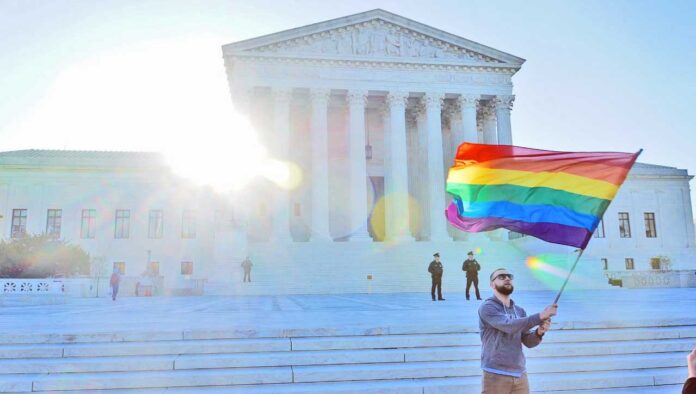Lambda Legal hosted a Facebook livestream on September 23 to discuss the importance of the Supreme Court — and a potential third Trump appointee — in shaping the lives of LGBTQ people. Access to healthcare and government services are among the issues impacting the LGBTQ community that hang in the balance.
Participants in the livestream included Lambda Legal staff members Sharon M. McGowan, Karen L. Loewy, Diana Flynn, and Omar Gonzalez-Pagan.
One of the highest-profile cases before the Supreme Court this fall is Fulton v. City of Philadelphia, which involves the placement of Philadelphia foster children. At issue is the city’s decision to pull the contract of Catholic Social Services because CSS refuses to place children with same-sex households. Philadelphia maintains that the actions of CSS violate the city’s Fair Practices Ordinance barring discrimination in public accommodations.
While the court’s decision in the case will directly impact foster children, particularly those who are LGBTQ, it will also impact anybody who accesses government services, including older LGBTQ people.
“The reality is that LGBT seniors rely heavily on government contractors that provide community based programming, meals, transportation, all sorts of other services,” Loewy said. “Given the higher incidents of not having family of origin to care for you as you age within the LGBT community, and not having as high a likelihood of having children to care for you or a spouse to care for you as you age, there is a much greater need to access these government funded services being provided by government contractors. So you’re seeing the harms across the lifespan from allowing religiously affiliated government contractors to say, ‘well, your civil rights laws don’t apply to me.’”
Another case of great importance to the LGBTQ community is California v. Texas, which involves the fate of the Affordable Care Act and whose arguments will be heard by the court one week after the Presidential election. When the ACA’s individual tax mandate was struck down in 2017 by Congress, 20 Republican-led states, including Texas, used that legislation to challenge the constitutionality of the entire ACA. Should the Supreme Court rule in favor of the Republican-led states, the consequences for LGBTQ people’s healthcare would be dire.
“More than 20 million Americans will lose immediate access,” Gonzalez-Pagan said, “countless LGBTQ people and people living with HIV who have had their access broadened and guaranteed by the Affordable Care Act will have their healthcare ripped away from them, and it’s really about life and death. And what’s unique about this and troubling is that in the last 60 plus years, over more than half a century, no major federal benefit program such as this has been struck down by the Supreme Court. And those are the stakes which we are talking about right now.”

The Trump administration, on its own, has continually tried to remove LGBTQ healthcare protections granted in the ACA (Rule 1557) as well as to grant health care workers the ability to discriminate based on their religious beliefs (the “Denial-of-Care” rule). Should future cases involving those decisions find their way to the Supreme Court, the balance of the court could determine, for example, whether Catholic healthcare facilities could deny admittance or whether emergency service personnel could refuse to administer aid to LGBTQ people because of their religious beliefs. According to the ACLU, 1 in 6 hospital beds is in a facility that complies with Catholic directives.
“Imagine not being able to access 1 in 6 hospital beds in a moment of emergency simply because of who you are,” Gonzalez-Pagan said. “Those are the stakes that we’re talking about, all in the midst of a global health pandemic.”
Gonzalez-Pagan also noted the importance of protecting laws providing reproductive healthcare, including Roe v. Wade, because they have served as the basis for many LGBTQ rights we have today.
“When we talk about the other litmus test that has been placed on these judges, which is about overturning Roe v. Wade and enacting barriers and obstacles to access to reproductive care, that is a signal that they will also be undermining those very foundations for LGBTQ equality.”
McGowan also stressed the idea that the results of court decisions ripple beyond the people directly involved in the cases.
“Even if we find ourselves in a posture where the federal government is no longer aiming at all of our rights,” McGowan said, “if the Supreme Court has said that it’s okay for the government to do that, we know that there are people living in states across the country that throw our civil rights out the window as political rallying cries. So we need to also recognize there are all of these different layers that are happening at the same time, so we need to recognize the threat and engage all the different ways in which these threats present themselves.”
Toward the end of the livestream, Flynn summed up what’s at stake if Trump’s third nominee were to be confirmed.
“It’s fair to say that you’re always threatened by a court that doesn’t recognize your inherent dignity, and regardless of what the test is, or the narrow legal principle that’s applied, a court that is hostile to your very existence in society can and would be more inclined to rule against you. And that’s a danger that we might well face if one of these individuals is confirmed.”
